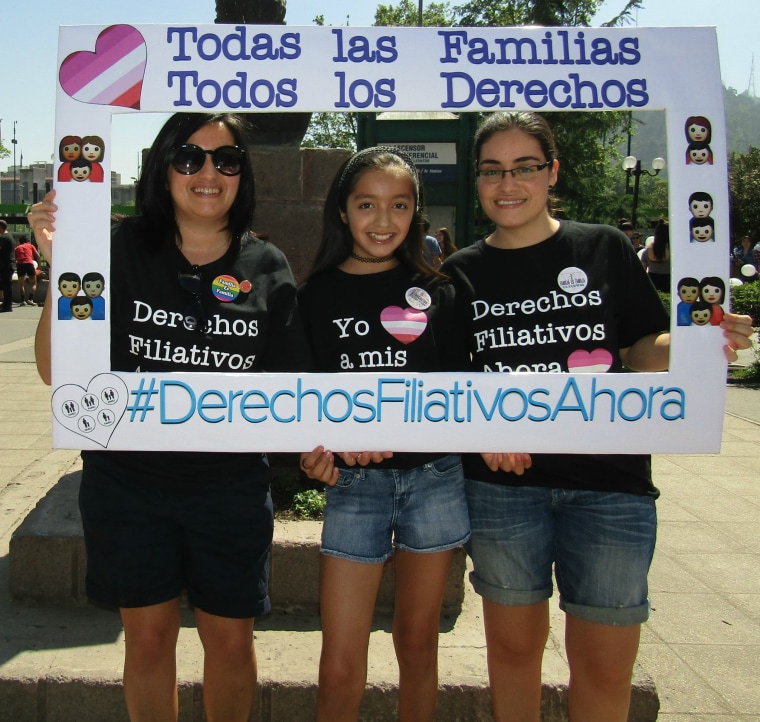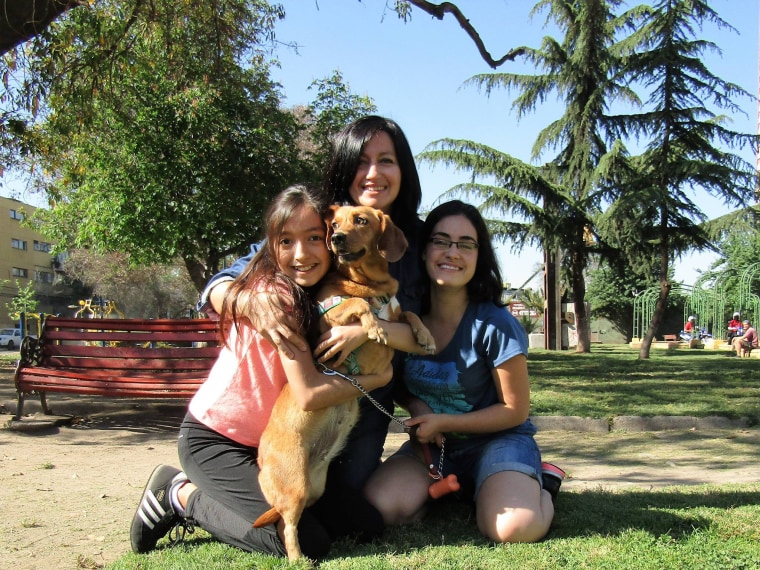All Claudia Amigo wants is for her daughter, Gabby, to be legally recognized as the daughter of her partner, Claudia Calderón.
Amigo and Calderón are fighting to have Gabby, 12, legally recognized by the government of Chile as the daughter of both women. Currently, Gabby is only recognized as the daughter of Amigo, who is Gabby’s biological mother, even though both women have raised Gabby together as a family for almost the entirety of Gabby’s life.

“There is no legal tie between Gabby and Claudia [Calderón],” Amigo told NBC OUT from her home in Santiago. “It just doesn’t exist.”
Amigo says same-sex families like hers are not protected by the current affiliation laws in Chile, which were put in place in October 1999 as a way of ending legal discrimination against children born outside of marriage. Before these laws, children born outside of marriage were marked as “illegitimate” on their birth certificates, and faced legal discrimination such as exclusion from educational institutions or a denial of rights associated to inheritance.
The affiliation laws put into effect in October 1999 were meant to make all children in Chile equal, regardless of the marital status of their parents. But because these laws didn’t take into consideration families of same-sex parents, and since marriage equality is still not a reality in Chile, Amigo says children like her daughter are still being discriminated against by being denied their right to be legally affiliated to both their parents.
“We see it as a fight that we have to give ... We can’t just cross our arms and give up, we have to be a part of these changes, because we see that there aren’t that many other families that dare to do it.”
“Chilean affiliation laws only protect opposite-sex parents,” Amigo said. “We know there is absolutely no protection for our family or families like ours.”
Because Gabby has no legal affiliation to Calderón, the family worries about what would happen to Gabby should anything happen to Amigo.
“A friend of ours, her girlfriend was the biological mother of their child. The girlfriend died of cancer, and our friend had no legal tie to their daughter,” Amigo cited as an example. “So the girlfriend’s family got in the way, and took our friend to court to try and take custody away from her. And our friend is still fighting.”
Amigo and Calderón don’t want anything like that to ever happen to their family, so in March 2015 the two mothers filed a voluntary petition to the Fourth Family Court of Santiago to have Gabby legally recognized as Calderón’s daughter.
The Family Court wouldn’t consider the case, and Amigo and Calderón ended up taking their fight all the way to Chile’s Supreme Court.

Christian Riego was one of the lawyers who represented the two mothers in court. “Before the Chilean courts, we asked the application [to Calderón] of [the affiliation laws] that allow a judge to [give the] declaration of father to any person who appears as such, [therefore] giving the child a public recognition as that person’s son or daughter,” Riego said.
The Supreme Court ruled in November 2015 against the two mothers, by a vote of three to two.
“We lost by one vote. Three against two people decided, legally in Chile, Claudia [Calderón] as a same-sex parent doesn’t exist,” Amigo said. “Basically what the Supreme Court said in the ruling was this is a law that needs to be changed on a legislative level.”
And so Amigo and Calderón took their fight to their political leaders. They started a family based non-profit advocacy group called Familia es Familia and started lobbying, even giving testimony in front of the National Congress.
In April 2016 their efforts paid off when the Affiliation Regulation for Children of Same Sex Families Bill was accepted into the Chilean Senate. If passed, the bill would offer three pathways to legally recognize the affiliation of same-sex parents to their children.
In the first case, children born through assisted fertilization would be legally affiliated to both mothers who went through the process, not just the birth mother. This would not apply to gay men, since gay men are not allowed to go through surrogacy in Chile.
In the second scenario, there would be a voluntary recognition of maternity for a child who has no particular affiliation to another parent. Again, this would be more difficult for gay men since when a woman gives birth to a child in Chile she is automatically registered as the mother, which means that child would always be affiliated to another parent. Men are not automatically registered as fathers unless they voluntarily go and register their paternity in the Civil Registry, which would offer a pathway for affiliation for a non-biological lesbian mother.
The third case would allow for the non-biological parent in a same-sex couple to adopt their child, and would offer protections to both lesbians and gay men. Currently, same-sex couples are prohibited from becoming adoptive parents in Chile.
The bill was sponsored by Senator Isabel Allende, who worked to get the bill in the Senate and had the support of four other senators. It is currently waiting for a vote, but Amigo sees getting the bill into the Senate as an important first step.
“We see it as a fight that we have to give,” Amigo said. “We can’t just cross our arms and give up, we have to be a part of these changes, because we see that there aren’t that many other families that dare to do it.”
Amigo said the bill was a collaborative effort between several different organizations, including Familia es Familia, Visibles, Agrupacion Lesbica Rompiendo el Silencio and Corporacion Humanas.
Erika Montecinos is the Executive Coordinator of Agrupacion Lesbica Rompiendo el Silencio and was involved in putting together the legislation. “The children of our lesbian and gay partners are not recognized in any way by the state,” Montecinos told NBC OUT via email. “We realized that many lesbian couples have no problem going through [artificial insemination] to fulfill their desire for motherhood, but when they are raising these children we realize the vulnerability they face.”
Montecinos said there are still many obstacles in getting the legislation ultimately passed by the National Congress, but she has been heartened by the support received by the senators who are already supporting the bill.
“We can say that [some] senators have become powerful allies and have also tried to raise awareness of the need and urgency for legislation on this matter,” Montecinos said.
Now all that is left is for everyone to wait.
Amigo said she is unsure when a vote will ultimately be held on the bill, but she understands it could take a long time. But Amigo says her and her family will continue to fight.
“I feel it’s our responsibility, and we’re going to talk to whoever it takes, whoever is willing to listen to us in the Congress or the Senate until we gain this,” Amigo said. “Until we earn our rights.”